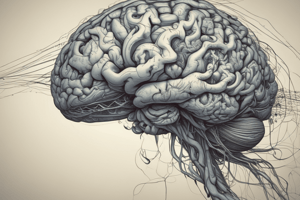Podcast
Questions and Answers
What are neurodegenerative diseases?
What are neurodegenerative diseases?
Incurable and debilitating conditions that result in progressive degeneration and/or death of nerve cells.
Which of the following are common neurodegenerative disorders? (Select all that apply)
Which of the following are common neurodegenerative disorders? (Select all that apply)
- Brain tumors (correct)
- Epilepsy
- Frontotemporal dementia (correct)
- Parkinson's disease (correct)
What is aphasia?
What is aphasia?
An impairment of language affecting the production or comprehension of speech and the ability to read or write.
What are the types of aphasia? (Select all that apply)
What are the types of aphasia? (Select all that apply)
What is dysphasia?
What is dysphasia?
What is the priority nursing diagnosis for a patient with seizures?
What is the priority nursing diagnosis for a patient with seizures?
Which of the following are signs of increased intracranial pressure (ICP)? (Select all that apply)
Which of the following are signs of increased intracranial pressure (ICP)? (Select all that apply)
What are the types of seizures?
What are the types of seizures?
Which clinical manifestations of Parkinson's disease would explain a patient being admitted with a fever and lung infiltrates on X-ray? (Select all that apply)
Which clinical manifestations of Parkinson's disease would explain a patient being admitted with a fever and lung infiltrates on X-ray? (Select all that apply)
Which meal option is best for a patient with Parkinson's disease experiencing swallowing difficulties?
Which meal option is best for a patient with Parkinson's disease experiencing swallowing difficulties?
Which of the following would not be included as part of routine seizure monitoring?
Which of the following would not be included as part of routine seizure monitoring?
Flashcards are hidden until you start studying
Study Notes
Neurodegenerative Disorders
- Incurable yet debilitating conditions resulting in the progressive degeneration or death of nerve cells.
- Cause issues with movement and mental functions, categorized into ataxias (movement disorders) and dementias (mental functioning disorders).
- Over 600 types of neurological disorders exist, including epilepsy, Parkinson's disease, and frontotemporal dementia.
Aphasia and Dysphasia
- Aphasia: Impaired language production or comprehension due to brain injury, commonly from strokes.
- Types include expressive, receptive, mixed/global, and dysarthria (difficulty articulating).
- Dysphasia: Language disorder characterized by difficulty in speech generation and comprehension from brain damage.
Communication Strategies for Aphasia
- Ensure patients' attention; minimize background noise.
- Keep communication simple and allow time for responses; avoid finishing sentences.
- Use gestures, drawings, and facial expressions to aid understanding.
- Encourage involvement in conversations without isolating the patient from family discussions.
Aspiration Pneumonia Prevention Strategies
- Keep the patient in an upright position during meals to facilitate swallowing.
- Tilt the patient’s head forward with chin down to aid food passage.
- Support the impaired side of the body for those with weakness.
- Position staff at or below eye level to encourage proper head alignment during feeding.
Increased Intracranial Pressure (ICP)
- Causes include infections, tumors, stroke, aneurysms, seizures, and hydrocephalus.
- Symptoms: non-responsive pupils, headache, behavioral changes, reduced alertness, muscle weakness, vomiting, confusion, and changes in consciousness.
Nursing Assessment and Management for ICP
- Assess for signs like headache, vomiting, speech impairment, and abnormal pupil responses.
- Maintain ABC (airway, breathing, circulation), elevate patient’s head, and manage body temperature.
- Administer medications (e.g., Mannitol) and monitor fluid levels and blood glucose.
Epilepsy and Seizures
- Characterized by abnormal brain activity leading to seizures and at times loss of awareness.
- Symptoms vary from temporary confusion to uncontrollable jerking movements and psychic symptoms.
- Categories of seizures include absence seizures, tonic seizures, clonic seizures, atonic seizures, and status epilepticus (a medical emergency).
Treatment and Nursing Management for Seizures
- Antiseizure medications include Carbamazepine, Diazepam, and Levetiracetam.
- Prioritize safety by padding side rails, securing bed positioning, and avoiding restraints during seizures.
- Maintain airway patency during recovery from seizures and educate family on care during seizure episodes.
Parkinson's Disease
- Affects dopamine-producing nerve cells in the brain, leading to muscle rigidity, tremors, and gait changes.
- Symptoms include difficulty swallowing, which can result in weight loss.
- Levodopa (and combination with carbidopa) is the primary medication for managing symptoms.
Relevant Case Questions
- Identify the best meal for patients experiencing weight loss due to swallowing difficulties.
- Recognize clinical manifestations in patients admitted with respiratory complications related to Parkinson’s disease.
- Discern which nursing approach is least helpful for confused patients.
- Determine which aspects are not relevant to routine seizure monitoring.
Studying That Suits You
Use AI to generate personalized quizzes and flashcards to suit your learning preferences.




